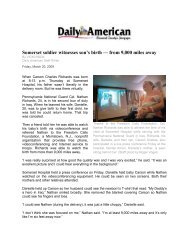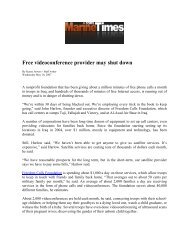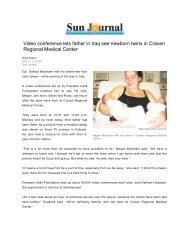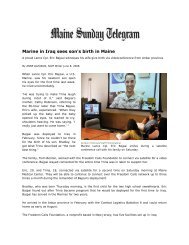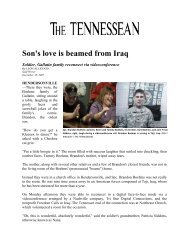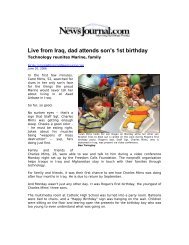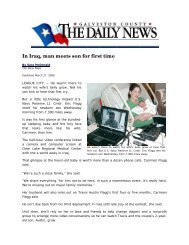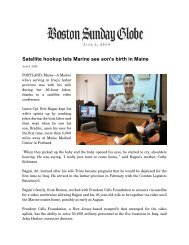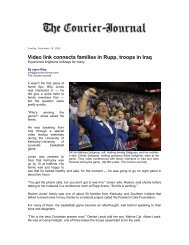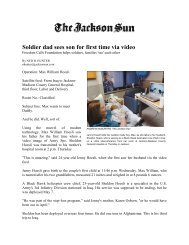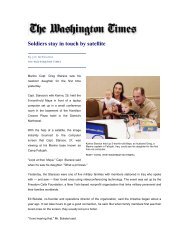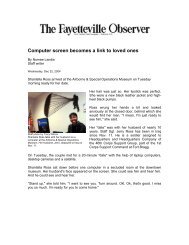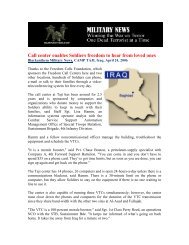Webcam keeps family connected - Freedom Calls Foundation
Webcam keeps family connected - Freedom Calls Foundation
Webcam keeps family connected - Freedom Calls Foundation
You also want an ePaper? Increase the reach of your titles
YUMPU automatically turns print PDFs into web optimized ePapers that Google loves.
<strong>Webcam</strong> <strong>keeps</strong> <strong>family</strong> <strong>connected</strong><br />
By ELISA A. GLUSHEFSKI<br />
eglushefski@potomacnews.com<br />
Sunday, September 17, 2006<br />
From 7,000 miles away in Iraq, Capt. Derek Poteet met his newborn daughter for the<br />
first time. The meeting went the way many corporations conduct business - via<br />
videoconference.<br />
His wife, Porsha Poteet, calmly sat in a chair in the conference room at Prince<br />
William Hospital, cradling day-old Susannah Karen Poteet in her arms, as their other<br />
four children went ecstatic over seeing their dad's face on a computer monitor.<br />
For a little more than an hour, Poteet was able to see and talk to his wife, children<br />
and mother through a satellite feed provided by <strong>Freedom</strong> <strong>Calls</strong> <strong>Foundation</strong>, a not-forprofit<br />
organization that provides free communications services to soldiers and their<br />
families.<br />
"You are a sight for sore eyes … you look great," the Marine Corps Reservist told his<br />
wife.<br />
"Yeah, I usually don't get dressed and curl my hair day two," she replied. "I can't<br />
wait until you can hold her."<br />
Eight-year-old Clara Poteet and her younger sisters and brother sometimes spun<br />
wildly in front of the Web camera mounted on top of the monitor and made funny<br />
faces to which Poteet made funny faces back.<br />
When they left with Poteet's mother, though, the room became quiet and Poteet<br />
spent time just gazing at his wife and baby.<br />
It was the first time he wasn't at Porsha's side for either the pregnancy or the birth.<br />
Poteet, who's been stationed in Al Asad since January, made the request to the<br />
foundation, which worked with the hospital to make the necessary arrangements<br />
within a matter of days.<br />
Poteet, who inspects U.S. and Iraqi detention facilities to determine if they are in<br />
compliance with the Geneva Conventions, spends most of his time on the road. So,<br />
there was no absolute certainty that he'd be able to be at the base where the<br />
equipment is installed.
"It was really great … an unexpected blessing," Porsha said.<br />
Advances in technology have not only changed the way wars are fought, but how<br />
relationships are maintained during those wars.<br />
The Poteet's have used that technology extensively, sending e-mails almost every<br />
day and usually talking at least every three to four days, Porsha said. Poteet even<br />
recorded a DVD of himself reading children's books for his other four children aged<br />
from almost 2 to 8.<br />
"This is the first war we've been able to ... communicate so robustly," Poteet said in<br />
response to a reporter's question.<br />
However, the technology can make life that much harder, Poteet said, because there<br />
is almost always some reminder of what you are missing at home.<br />
"Your heart aches to be with them," he said. "But it's wonderful to see them."<br />
The foundation has three facilities in Iraq, with 50 computers and 20 telephones at<br />
Camp Taji and videoconferencing facilities at Camp Fallujah and Al Asad Airbase,<br />
according to a <strong>Freedom</strong> <strong>Calls</strong> press release.<br />
Poteet will return home in about a month.



